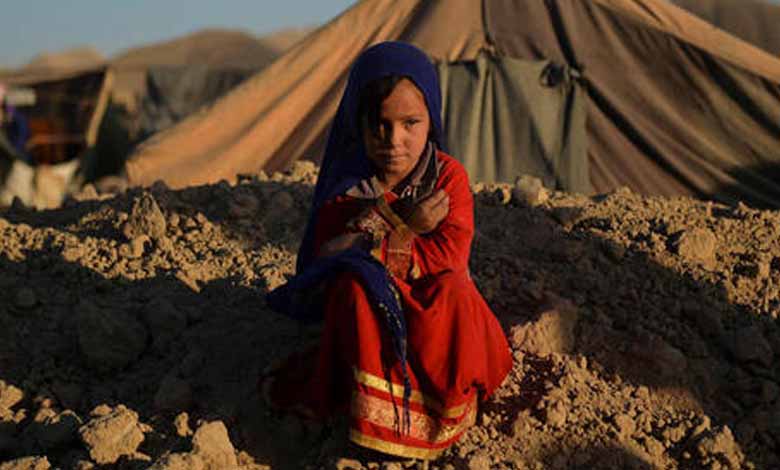Afghans forced to sell their children after international aid stops

The situation in Afghanistan is worsening and poor families are paying the price, especially girls who are sold under the name of marriage to elderly men.
The Taliban took control of Afghanistan last August, and since then countries have cut off aid to Afghanistan.
CNN published painful testimonies from Afghan families who were forced to sell their young girls to elderly men in exchange for enough money to cover the rest of the children, al-Hurra reported.
Barwana Abdel Malek, 9, was playing rope jumping with her friend near her parents’ modest mud house.
The smile fell from her face when she knew her father would sell her to a stranger over 55. “He is old with white eyebrows and a thick beard covered with gray hair,” adding: “I fear he will beat me and force me to bear the domestic burden“.
“For four years, the family has been living in a camp for displaced people in the north-western province of Badghis, where the family lives on humanitarian aid and does some low-paying jobs.”
Father Abdel Malek says: Things have gotten worse, and the cost of life has become very expensive following the Taliban’s takeover on August 14, the interruption of international aid and the collapse of the country’s economy.
The desperate father said that he could no longer provide for his family’s minimum food needs, noting that he had sold his 12-year-old daughter a few months earlier.
Barwana is one of many Afghan girls sold into marriage as the country’s humanitarian crisis worsens and the onset of the country’s notoriously harsh winter looms.
Before his daughter was sold last October 24, Abdel Malek said he could not sleep at night. He felt guilty, in pain, and in shame because he had to give his liver to a stranger who had turned old. “I went to the provincial capital looking for work in vain, borrowed from relatives and acquaintances, and my wife begging for food from camp residents, but in the end we had no other choice but to feed the rest of my family, as I have eight children“.
He admitted that the money he would get would be enough for only a few months, before he looked for another solution.
Barwana had hoped until the last minute to dissuade her father from selling her, telling CNN she had dreamed of continuing her education to become a teacher, but her pleas and crying proved futile.
When the buyer, called Gurban, arrived, he said he bought the child for 200,000 Afghans (about $2,200), refusing to call what happened a marriage. He said he had a wife who would look after Barwana and treat her like one of their children.
He added: “Her father is very poor and needs money, and I bought her for a cheap price… She will work in my house, but I will not beat her or mistreat her. I will be nice and gentle with her like she is one of my children”.
As the child was pulled out of her hand, her feet clinging to the dirt floor of the house, Malek told Gurban with tears in his eyes: “Please, she’s your wife now, and she’s under your wing… Take care of her, and don’t beat her”.
After the sad scene, Gorban hurried his “bride” inside his car to drive off, leaving behind a dust storm and a poor family in tears.
In another similar story, in Ghor Province, another father claims that he had to sell two girls, aged 4 and 9, and says: “I don’t have work like most of people in the camp I live in, but my situation is more difficult, because I have a physical disability”.
The father explained that he would sell each child for 100,000 Afghans (about $1,100) each. The 4-year-old said she knows why her father would do it.
“Another sister, 9-year-old Magol, said she would consider killing herself if she forced to be with an older man, adding: “I don’t want to leave my father… I wish that I stay with my family”.
Their grandmother, Rokhshana, wept: If we had anything to eat, or we found someone to help us, we would not sell our daughters, but we have nothing to do with it”.
Many families and experts expressed frustration over the lack of aid during the worst times of the country.
“Humanitarian workers are still at the top of their job, providing relief and support to hospitals, but that’s not enough,” said Isabelle Mossard Carlsen, head of the UN Office for the Coordination of Humanitarian Affairs.
Carlsen acknowledged that world leaders should hold the Taliban accountable for human rights abuses, but cautioned that the longer Afghanistan lasts without humanitarian and food assistance, the more families face starvation and the more girls are likely to be sold.












